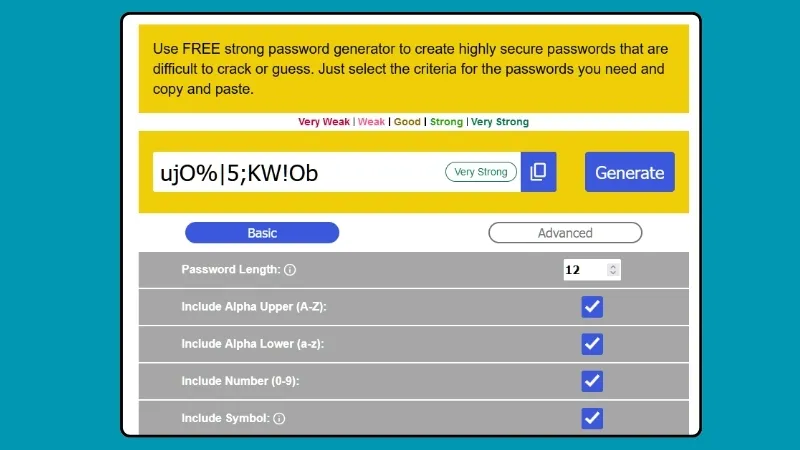
Like the mythical Sisyphus eternally pushing a boulder uphill, you might find yourself struggling with the challenge of maintaining secure passwords. An encrypted password generator can alleviate that burden by creating strong, unique passwords tailored for each account.
It guarantees that your passwords are securely stored and resistant to cyber-attacks while generating complex combinations that are difficult to guess. By using this tool, you not only streamline password creation but also notably reduce the risks associated with relying on a single password.
Not only does an encrypted password automate the tedious process, it ensures your passwords meet modern security standards, protecting you against hacks. As you consider your current approach to password management, you might wonder how this tool could greatly enhance your overall cybersecurity strategy.
Some Key Benefits of an Encrypted Password Generator for Maximum Security
An encrypted password generator is essential for enhancing your online security, such as:
Encryption for Secure Storage
In today’s digital landscape, ensuring the secure storage of passwords is more essential than ever. An encrypted password generator plays a significant role in this process, as it guarantees that the passwords you generate are not only robust but also safely stored.
When you utilize encryption, you prevent unauthorized access to your stored credentials, even if your password manager or database gets hacked. By adopting an encrypted password generator, you take a proactive stance against potential vulnerabilities, safeguarding your digital assets from evolving threats.
The encryption process scrambles your passwords, making them unreadable without the appropriate decryption key. This means that even if hackers manage to access your data, they won’t easily decipher your credentials.
Protection Against Cyber Attacks
Utilizing an encrypted password generator greatly enhances your defense against cyber attacks by creating passwords that are not only complex but also entirely random. This randomness considerably reduces the likelihood of successful brute force or dictionary attacks, which are prevalent in today’s digital landscape.
Attackers often exploit predictable or common passwords; a password generator keeps your credentials complex enough to make these attacks almost impossible. When you rely on an encrypted password generator, the algorithm produces an assortment of numbers, letters, and special characters.
This variety complicates the process for potential attackers, as they must now contend with an exponentially larger set of possible combinations. The randomness further diminishes the effectiveness of automated tools that typically rely on known password patterns.
Avoiding Easy-to-Guess Passwords
When it comes to password security, relying on an encrypted password generator is crucial for avoiding easy-to-guess passwords. These generators eliminate the temptation to create simple passwords like “password123” or “qwerty,” which are often the first targets for hackers.
Encrypted password generators follow security best practices, including those recommended by the National Institute of Standards and Technology (NIST). Using a password generator, you can verify that each password is not only complex but also random, making it markedly harder for cybercriminals to crack.
The randomness guarantees that your passwords don’t follow predictable patterns that hackers exploit. Additionally, the generator can create passwords of varying lengths and complexity, which further enhances security.
Convenience in Creating Secure Passwords
Creating secure passwords can often feel like an intimidating task, especially with the need to balance complexity and memorability. Manually generating passwords for multiple accounts can quickly become cumbersome and fraught with errors.
Automating password creation with an encrypted password generator streamlines it a lot while adhering to security guidelines. These tools allow you to customize parameters such as password length and character diversity, ensuring compliance with the most demanding requirements.
By eliminating the guesswork, you save valuable time and reduce the cognitive load associated with remembering various complex passwords. Instead of struggling to devise unique combinations, use a password generator for strong, randomized passwords that enhance your security.
Reducing Risks from Single Password Compromises
To mitigate the risks associated with password compromises, employing an encrypted password generator is vital for maintaining robust security across your digital accounts. When you reuse a password across multiple accounts, a single compromise can lead to widespread access by attackers.
This not only endangers your personal information but can also result in unauthorized transactions or data breaches. An encrypted password generator addresses this vulnerability by creating unique passwords for each account.
By doing so, you notably limit the risk of a breach cascading across multiple systems. If one password is compromised, the damage is contained, preventing attackers from easily infiltrating your other accounts.
Moreover, integrating this approach with Privileged Access Management (PAM) enhances security for sensitive accounts. PAM solutions can monitor and restrict access to critical systems, ensuring that even if an encrypted password is compromised, the potential fallout is minimized.
Customizable Password Requirements
Customizing password requirements enhances security while accommodating user needs and compliance mandates. An encrypted password generator empowers you to specify parameters like password length and character diversity, which is vital for tailoring security to your specific context.
For instance, you can create passwords that follow organizational policies or industry standards, like NIST guidelines, which emphasize complexity and length. Make sure your passwords are secure by mixing uppercase letters, lowercase letters, numbers, and special symbols.
Integration with Multifactor Authentication (MFA)
Integrating an encrypted password generator with Multifactor Authentication (MFA) greatly enhances security posture. While strong passwords serve as a crucial first line of defense, MFA introduces an indispensable second layer that further mitigates risks.
The MFA method ensures that unauthorized users can’t access your account even if your password is compromised. Using an encrypted password generator, you create complex, unique passwords tailored to each of your accounts. This prevents password reuse, which is a common vulnerability exploited by attackers.
Why are strong encrypted passwords crucial for data security?

Recognizing the pivotal role of strong encrypted passwords in data security is essential for both individuals and organizations. These passwords serve as a critical first line of defense against cyberattacks.
When you use a strong encrypted password, it considerably raises the bar for attackers attempting to gain unauthorized access. They make it exceedingly difficult for malicious actors to employ brute force methods, dictionary attacks, or social engineering tactics to guess your credentials.
What are the essential characteristics of a strong password?
When creating secure credentials, understanding the components of a strong password is paramount. A robust password should combine uppercase letters (A-Z), lowercase letters (a-z), numbers (0-9), and special characters (e.g., !, @, #, $).
This diverse mix greatly increases the complexity of your password, making it less susceptible to brute-force attacks. NIST recommends that passwords be at least 12 characters long. The length adds another layer of security, as longer passwords take exponentially more time to crack.
Additionally, avoid easily guessable patterns like sequential numbers (1234), repeated characters (aaaa), or common phrases. These patterns can be quickly identified by attackers using automated tools.
What is a foolproof password strategy for data security?
Implementing a foolproof password strategy is essential for safeguarding your data against unauthorized access. Start by using a password manager to generate and store unique passwords for each of your accounts. This eliminates the risk of reusing passwords, which can lead to significant vulnerabilities.
Next, enable Multifactor Authentication (MFA) wherever possible. This adds an extra layer of security, requiring you to verify your identity through a secondary method, like a text message or authentication app.
Fortify Your Digital Vault with an Encrypted Password Generator
Incorporating an encrypted password generator into your security routine is like having a fortified vault for your digital assets. By creating unique, complex passwords, you greatly reduce the likelihood of unauthorized access.
A password manager further streamlines this process, ensuring you stay organized and secure. As cyber threats evolve, adopting these tools is essential for maintaining robust data security. Don’t leave your sensitive information unprotected; implement these strategies to safeguard your digital life effectively.
